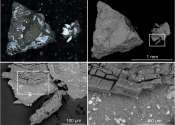Europe's drinking water contaminated by 'forever chemical': NGOs
A large sample of European drinking water has detected a substance linked to "forever chemicals" used in pesticides and refrigeration, a coalition of non-governmental organizations said Wednesday.









